I have been rethinking how to sell books for a few years now. Like any sell-able product, books too can clash with environmentalism. Thinking of the latest space trip with former Amazon CEO Jeff Bezos, whose company doesn’t pay taxes, and whose motto seems to be to pollute space and use it as a rich man’s playground, has got me thinking about all the ways to avoid Amazon as much as possible. The company is automatically part of Ingram’s catalog and distribution, so I want to focus on other ways to buy my books.
I might write a lot of words, including hundreds in the books I’ve edited or published so far, that tell various speculative or reflective stories of how our lives and ecological and climate destruction are part of a vicious cycle. If there’s a story to tell, that means that there’s also actions, as authors, to take in our personal lives. And no matter how many words or stories I create to fight ecological (and thus economic) impact in our world, it really doesn’t mean a thing if I don’t act on my own ambitions to mitigate the storm. It’s not only ecological. Any time natural systems and species are threatened or go extinct, we get closer to more uninhabitable weather due to extreme fires and storms, which affects the health and livelihood and economy of all species; we are all guilty of contributing to industry ventures–often because there’s so few (or no) other options. But some big businesses, particularly the meat industry and any industries related to fossil fuel extraction and uses, are contributing more CO2 than others. Not supporting these companies has been one of my and my husband’s goals for years. We finally bought an electric car a few years ago–and then learned about the “white oil” problem of lithium mining. You can’t win, can you? Our hope is that tech produces better batteries in the future and that the remaining stuff is left in the ground. Still, compared to oil and gas, electricity is much cleaner. We also bought a house last year, which was financially more doable than even just renting back in the Vancouver market. We finally were able to install solar panels and ensure that our yard and meadow remained a place for pollinators and a wild abundance of flora and fauna. We try to do our part, and we’re constantly newly learning things, so there’s always a revision of our lifestyle to do what’s right, in some cases what’s best.
Coming back round to books, which is my thing. Since moving to Nova Scotia last year, in the midst of a pandemic crisis, I have looked for work but want to work remotely these days. Covid numbers come and go, and while our province is doing well right now, in April we had a rise of cases. I’d like to dream that someday we won’t have such a crisis, but given the number of people who refuse to vaccinate or even wear masks, and the new variants we’re getting, this doesn’t look likely anytime soon. I actually had a job interview earlier this week, but am trying not to get my hopes up. It would be exciting though. It’s remote and a 13-month contract job. I’m also getting more small jobs (i.e. speaking panels and editorial work), which helps.
Anyway, my dream job was always to work with books. I grew up in a bookish family. My parents had loads of books and built-in bookshelves, and my father spent most of his adult life working at the world’s largest printing company. He was way ahead of his time, and even before it ever became a thing, he developed a patent for technology that would aid in on-demand and digital printing. Around that same time, when I was working as a senior editor, I developed a book about electronic publishing; it never sold well because the world wasn’t ready for that. I am a lot like my dad!
I opened a publishing company in 2009 and, for years, took on mostly other authors, though did publish my novel there too. My first book at the company was really just a free toolkit explaining my mission and business goals as I planned to use sustainable resources in publishing and give back to nature. The toolkit came out in 2010, was a resource for green publishers, and I last made major updates on it in 2013, so many of the links are now invalid and I haven’t found time to go update them. Running a press was fun, and I got to know several people I will most likely keep in touch with for life. I found that the process of moving books from acquisitions through publication was exciting. I liked deciding how to format the book–style, font, margins, etc.–and loved the editorial process. My least favorite part of the process was all the bookkeeping, which I have always done myself. I did the business taxes, the marketing budget, the royalties, and so on. However, when I opened the press I was only working part-time. When I began working full-time soon after, doing all the work as a staff of one became very difficult. I loved it though and might have kept going on it if the books sold enough for me to be able to properly market new books for the authors’ sake. I quickly found that even submitting books for awards was an expensive process. I always described myself as an independent niche press and made sure my authors knew that, but I still felt guilty for not being able to afford the kind of expensive reviews and marketing that bigger publishers, or publishers that were funded, could afford. In my case, I was not funded and was a new press supporting mostly never-before published authors. I wasn’t even eligible for small press distribution in Canada due to not being big enough. It was always a catch-22. My decision to close the press after honoring the contracts, which all end by next summer, was quite a relief. I had opened an imprint of the press in order to publish my own occasional book and also will transfer over one of the titles that is an anthology. I have never had to deal with individual royalties for that book but do donate a portion of sales each year to 350.org, which was agreeable to authors and in fact what they voted on. The book is being taught in some classrooms, so every once in a while I see that a bunch of copies have sold, and it makes me–as well as the contributing authors–happy.
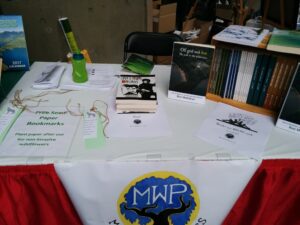

Anyway, I’ve also worked in the book industry both professionally and privately, and my curating work at Dragonfly.eco helps to fulfill that love of being around books: reading them, spotlighting them, and so on. Dragonfly.eco probably saved me as I needed something to do that I wasn’t doing yet, and it became a successful resource for many authors, publishers, teachers, students, scientists, journalists, video game creators, and artists.

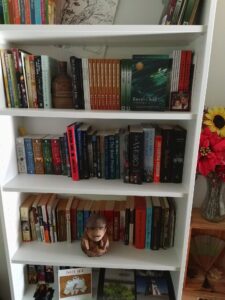
A few years ago I began collecting books when we lived in the Vancouver area, but, sadly, we didn’t bring a lot of things with us when we moved, so I have started the collection again. We have built one bookshelf so far, but the plan is to have bookshelves cover one of the walls in my study.

My real dream has always been to work in a bookstore though. After college, I took on a part-time job at Barnes and Noble, which I did after my regular full-time writing job, but the store was more corporate and not as down-to-earth as the kind of bookstore I always imagined working in. My dream was to work in a used bookstore that would be the cornerstone of a town or part of a city that was well-known for the arts. The kind of place that you can walk in, be greeted by someone friendly, and possibly spend hours walking the aisles–browsing magical surprises on the old wooden shelves, discovering gems, smelling the incense of old books and wood, maybe even coffee or tea. When visiting new areas, any time I’ve ever traveled, I’ve always been the type to dip into a used bookstore or library rather than anywhere else. I kind of get lost in them.
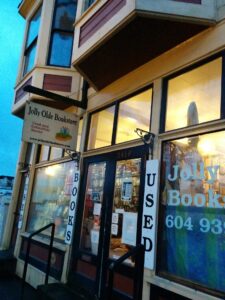
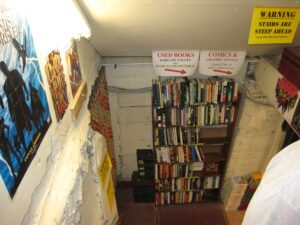
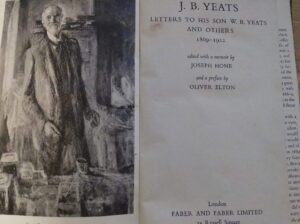


The library in the Carlos Ruiz Zafón’s The Shadow of the Wind mesmerized me. It was the cemetery of forgotten books. From that book are sayings I’ve never forgotten, ones that reflect my own thoughts from growing up reading:
Every book, every volume you see here, has a soul. The soul of the person who wrote it and of those who read it and lived and dreamed with it. Every time a book changes hands, every time someone runs his eyes down its pages, its spirit grows and strengthens.
A story is a letter that the author writes to himself, to tell himself things that he would be unable to discover otherwise.
I was raised among books, making invisible friends in pages that seemed cast from dust and whose smell I carry on my hands to this day.
Everything about old bookstores, their innards, their fronts, their memories, speaks volumes to me. Funny, I think that other than dreaming about writing books when I was young, I dreamed about working in a bookstore. Maybe someday? There’s not much money to be made in used books unless they are rare, but it is not pricey rare books I want to deal with. It’s the books with spirit, sometimes the ones very few people know about. The kind found in cemeteries of forgotten books.
Back to the whole Amazon thing, the positive part of Amazon is that it’s easy for publishers, especially tiny indie publishers, to get their books into a print or e-book format, and of course, Amazon is huge. I’ve never sold tons of books, and when I have made bigger profits, most of my earnings go right back into the business tax, but Amazon was a positive for making things affordable. It was also in my contract with authors that I would offer their book in both e-book and print book formats and that the distribution (in my case, Ingram Content Group, which does on-demand printing and uses sustainably managed forests for fiber) includes Amazon and other popular retail book sellers. Problem is, I can no longer support the company and am not sure why I still do. If I support that company, I’m not only supporting a giant retail company that’s put local businesses out of business but also does makes money through cheap labor in other countries. Why support a company whose billionaire founder (and now on the Amazon Board) is being wasteful and too playful with money that could be spent more ethically. Sure, he might have the right to spend money how he wants, but I have the right not to support a company that built that person or still has it in its ethics to use the model they do. We have long decided to buy local rather than on Amazon. I have, for years, looked into a reasonably priced book seller and distributor other than Amazon, and it’s something I’ll write more on later. I’m stuck in some contracts until August of next year. But I have my own publishing to decide differently on. I can still make physical books with Ingram, but also do not have to distribute through them to morally shallow book sellers whose model goes against fair wages, employee treatment, and a number of environmentally sound practices. Other possibilities are bookmanager.com and bookshop.org. I’m also trying out a pro-plugin on my publishing website that allows people to read books online. We also set our Amazon Prime membership to not renew this year. My goal is to be off Amazon entirely by the time my last author contract ends in August next year.
I would suggest to all of us who work within printing and bookselling models that Amazon is now built into to question this model of publishing that was built on greed, wherein rich men whose companies are tax-exempt are suddenly sending themselves into space, which will be the new horizon wherein western eminent domain or some sort of rich conquest will go–and where we go, we will also continue to contribute to pollution of the new horizon and the fossil fuel consumption to get there, which has already warmed this world to the degree that climate change is more obvious than any previous year. I’ve said it before, there is no planet B. Let’s take care of our world.
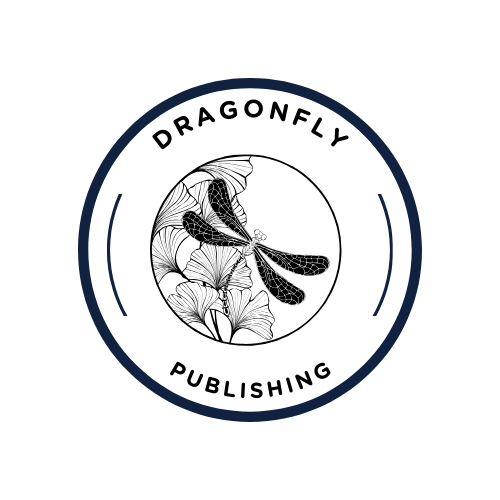
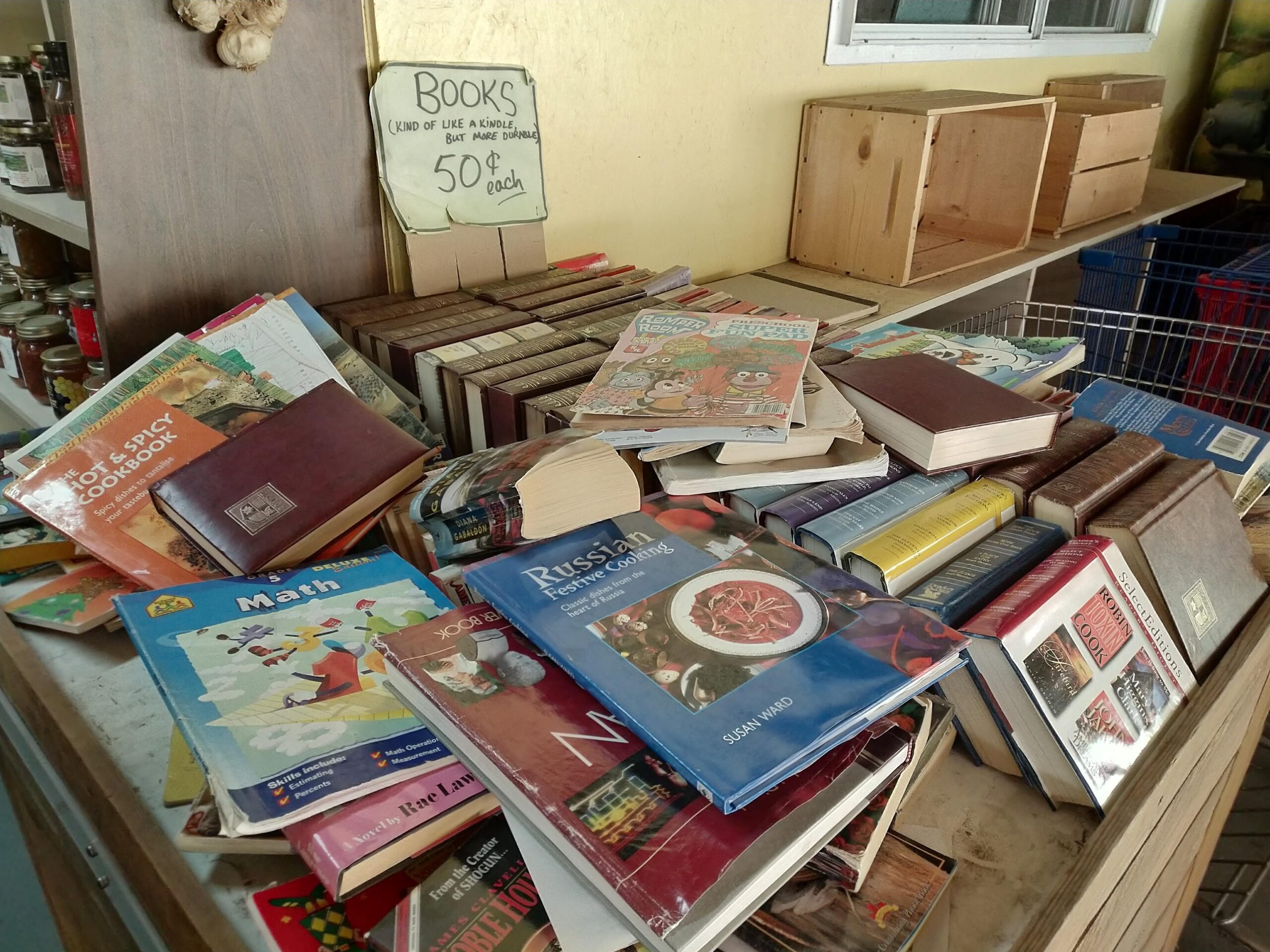






Comment on “For the Love of Books”